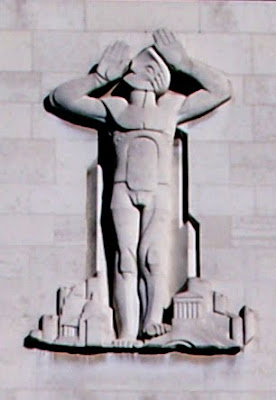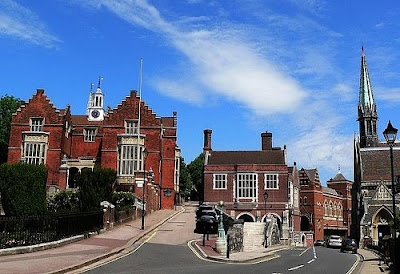
I've been so wrapped up in documenting the extremely interesting lives of various members of the Goodland family—a task that is still incomplete pending the completion of the younger Gillmore Goodland's life story—that I neglected to impart some information regarding the Goodland of our primary interest: Joshua Goodland, future mentor of George Mills.
In wondering how Joshua's architectural career may have overlapped his time as a law student at Cambridge, I queried a couple of resources about him.
Here are their recent replies, the first one being from the Architects Registration Board, an organization that apparently uses their limited supply of on-hand punctuation marks quite sparingly:
RE: Goodland, Joshua
Jamie Bloxam [JamieB@arb.org.uk]
Sent: Tuesday, April 12, 2011 12:53 PM
Dear Sam
Thank you for your email and sorry for not getting back to you sooner. I can’t find any information on Joshua Goodland – I have looked in our archive Registers that go back to 1933 but can’t find any record of him. Have you tried the Library or the Royal Institute of British Architects [ RIBA] their number is 020 7580 5533 or you can visit their website http://www.architecure.com
Please do let me know if you need any further information
Kind regards
Jamie

Jamie Bloxam
Registration Administrator
Architects Registration Board
You'll actually find their website at: http://www.architecture.com/. Anyway, I had, indeed, already contacted the Royal Institute of British Architects [pictured below, right], and here's their reply:
RE: cm : Goodland, Joshua
Info [Info@inst.riba.org]
Sent: Wednesday, April 13, 2011 11:27 AM
 I regret I cannot find anything on the above architect. I have checked to see if he is a member of the RIBA – but there is no record for him. Architects did not have to be members of the RIBA, nor would they have had to have formal architectural degrees. Most, during this time, would have been apprenticed to an architectural practice for their education.
I regret I cannot find anything on the above architect. I have checked to see if he is a member of the RIBA – but there is no record for him. Architects did not have to be members of the RIBA, nor would they have had to have formal architectural degrees. Most, during this time, would have been apprenticed to an architectural practice for their education.Sorry I cannot help you further.
Kind Regards
Claudia Mernick
Riba Information Centre
Thanks, Claudia!
That's actually a great deal of help. We now know that, probably with a letter of reference from Cardiff's G. E. Halladay (his architectural master) in hand, Joshua Goodland could have done architectural work throughout England at the turn of the century without any sort of license or registration at all. Caveat emptor?
Now, I don't think that Goodland was designing any vast, multi-storied buildings or sprawling factories for major corporations between 1900 and 1908, but it would have been possible for him to have done minor commissions for local builders.
 My only question about that would be: Is it reasonable to think he could have met with those builders, looked at sites, negotiated terms, drawn plans, and studied law at perhaps the most prestigious and presumably demanding law school in Britain—as well a serving as a law coach to others during that span of time—and still have had time to take the frequent long holidays away from Cambridge [left] that we know he took?
My only question about that would be: Is it reasonable to think he could have met with those builders, looked at sites, negotiated terms, drawn plans, and studied law at perhaps the most prestigious and presumably demanding law school in Britain—as well a serving as a law coach to others during that span of time—and still have had time to take the frequent long holidays away from Cambridge [left] that we know he took?After all, Goodland at the very least spent months on a hunting excursion in North America, traveled throughout Sweden and Russia, took at least one trip around the world, and spent vacations golfing in Sussex. That's a pretty full plate for a man who is struggling to make ends meet.
Hence, it still seems probable that, despite income as a sometime law coach and a sometime architect, while paying tuition as a full time law student (We have no knowledge of any sort of scholarship allowing him a free education at Cambridge) and coming up with rent for a flat on Trinity Street, Joshua was receiving financial aid from another party.
That party must have been his brother Gillmore, a man, we'll find out, who was frequently in need of a good lawyer, and who may have bankrolled Joshua for just such a purpose.
More about the fascinating Gillmore Goodland next time…
















![Meredith and Co. [1933] by George Mills](https://blogger.googleusercontent.com/img/b/R29vZ2xl/AVvXsEjlUeRNPnH8Xd8JT59QdtabQHRI6DI6Hqew57i6qixjOL3LjgUD9g22o3-wNlmBya36D5-6KZXX-sxLnktAfEqjlvTmdwyiIL2K6VHOGW2Wq9Pe8_oFGknENfVE1Xrkdj0b8FYXTz_6SMg/s1600-r/sm_meredith_1933.JPG)
![King Willow [1938] by George Mills](https://blogger.googleusercontent.com/img/b/R29vZ2xl/AVvXsEgiz_iaQjinIbVw6yQ-W4hwx6wGJwMQH9azCs3Qacp9eX627B7Eq9hMn1wlHLzlkbcflHRWM8VcPX-1uteKbs4LA5q5Oq69WhrnhzBQLjpseK_M34PSoOOhTZ96EfVAGFehG53gZ0M4EvU/s1600-r/sm_1938.JPG)
![Minor and Major [1939] by George Mills](https://blogger.googleusercontent.com/img/b/R29vZ2xl/AVvXsEgH5nj4Q6BNpzVEb1vyJeGV6ikuN4SFAyDa-jypIgbvdrxqcjHkNxqjrXH7ptZmge7oTTpn5QjAI0yCJPdI-fIzooCDD1TAA3RDxO9jzLcU3QOIhBWKiKNz6CPjCSTZgIPd9_4zM7LLpAw/s1600-r/sm_1939.JPG)
![Meredith and Co. [1950] by George Mills](https://blogger.googleusercontent.com/img/b/R29vZ2xl/AVvXsEgm_JPAXPpX0wb8bDkjYG67Sg1HePiPhRP6b9oUMWvkJhiW6XJzmxTQ7TBepfxpPgRrFNCRuumYRj-SAfU9Kw-uDsbO5HBtyxfQfClHVMJxJUkDpbkrCPhzpC4H_g_ctlirgnSla4vX1EQ/s1600-r/sm_1950.JPG)
![Meredith and Co. [1957?] by George Mills](https://blogger.googleusercontent.com/img/b/R29vZ2xl/AVvXsEg0zRm3-CCmA8r2RrBmrACDvmxJjoBjfxUoPI9yc6NWu1BZ3dd89ZvCixmmKZe1ma0QiDIrsDZNqf-8h1egh0JLiRYHagXAqQ1UknWPy6SksK76psYPcEMLGa_Aj7wo2vMFPo0aMdcx_pg/s1600-r/sm_meredith.JPG)












